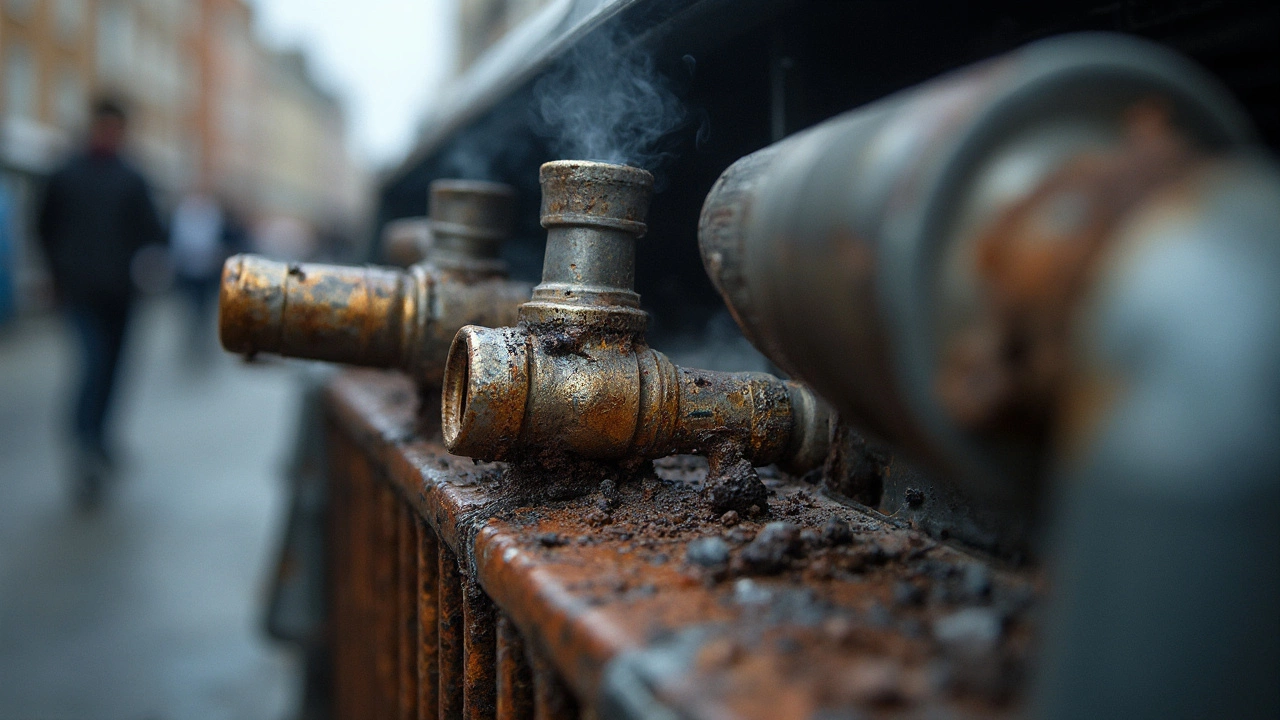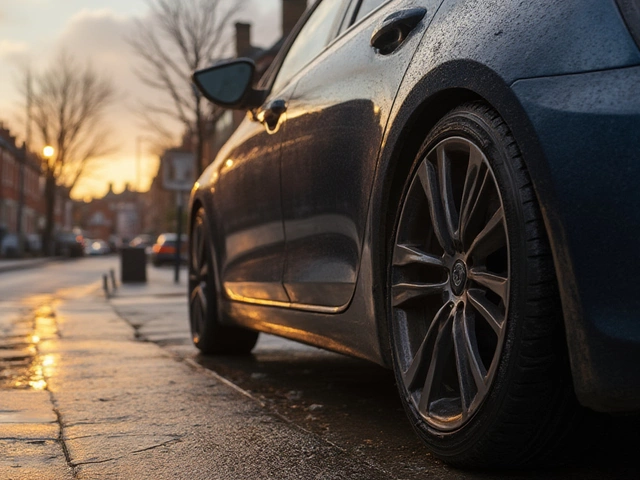So your car radiator's acting up, and you're stuck wondering whether to fix it or just toss it out entirely. You're not alone. This decision nags at many car owners, especially when mysterious leaks and overheating start becoming regular annoyances. But what if tackling the problem isn't as daunting as it seems? Let’s dig into that.
Radiators are crucial in keeping your engine cool by circulating coolant and preventing nasty overheating. Trust me, once you start understanding what goes wrong with these metallic lifesavers, deciding on a fix becomes much easier. Understanding the common gremlins like leaks, rust, or blockages can help you assess the situation better.
Now, let's talk money. Repairs rarely come cheap, and figuring out when a fix might lead you down a financial rabbit hole versus when it’s a quick patch-up job can save serious cash. Understanding how much you’re looking at dropping on repairs, compared to ponying up for a shiny new replacement, is crucial. Sometimes, investing in minor repairs can extend your radiator’s life, but other times, you might just need to let it go.
- Common Radiator Issues
- Repair Costs and Considerations
- When to Replace vs. Repair
- Tips for Extending Radiator Life
- Consequences of Ignoring Radiator Problems
Common Radiator Issues
Car radiators are the unsung heroes of your engine’s well-being, quietly keeping things cool and steady. But even heroes have their off days. When a radiator starts acting up, the problems can sneak up on you. Here’s a lowdown on what typically goes wrong, so you can catch issues early and avoid bigger headaches.
Leaks are probably the most notorious troublemakers. A leaky radiator can stem from anything—a crack, worn-out hoses, or even a dodgy cap. Keep an eye out for greenish puddles under your car or frequent low coolant warning lights. Catching a leak early might save you from shelling out big bucks in repairs.
Another issue is rust or corrosion. Your radiator, chugging along daily with hot coolant, is bound to face some wear over time. Rust can spring up, especially if you live in a place with humid air or lots of road salt during winter. Regular flushes and using the right coolant mix can be lifesavers here.
Ever had your check engine light come on while the car’s temp gauge goes red? That’s likely your radiator screaming for help with overheating. Sometimes it’s because of debris blocking airflow, or maybe the thermostat went on strike. A quick check under the hood for blockages or a mechanic’s assessment can pinpoint the problem.
Last but not least, a clogged radiator can be a real pain. Mineral deposits from old coolant start gumming up the works, restricting coolant flow. The outcome? Poor temperature control and potential damage to your engine. A regular coolant exchange can keep these troubles in check.
- Leaks: Watch out for puddles and low coolant levels.
- Rust and Corrosion: Regular maintenance prevents this.
- Overheating: Clear blockages and check the thermostat.
- Clogs: Don’t let deposits ruin your day—schedule coolant exchanges.
Understanding these issues and tackling them ahead of time is crucial. Keep your radiator in top shape, and your car will thank you in the long run by staying off the side of the road.
Repair Costs and Considerations
Alright, let’s get into the nitty-gritty of car radiator repair costs. It's like comparing apples and oranges sometimes, because the price can vary based on the make and model of your car, and the extent of the damage.
If you're experiencing a simple leak, it might just mean patching up a few weak spots or replacing some worn-out hoses. This could run you anywhere from £50 to £100. Not too bad, right? But, those numbers shoot up when you start dealing with serious size cracks or a radiator that's completely corroded.
Here’s a little breakdown of what you might expect:
- New radiator replacement: This can set you back between £200 and £400, including labor, depending on your vehicle’s make and model.
- Thermostat replacement: If it's not the radiator but the thermostat playing up, that's around £120 to £150.
- Flushing the coolant system: This service generally costs about £50 to £100, an important maintenance task to prevent bigger issues.
When pondering whether to fix or swap out that old radiator, consider what the problem is actually costing you. Keep in mind, running with a faulty radiator can lead to engine overheating—which, we all know, could mean a blown engine that costs a fortune to fix.
Now, let's be real for a moment. Not every radiator woe needs a brand-new radiator. Sometimes a repair, although a bit pricy short-term, might save your wallet from a bigger hit down the line. In any case, weigh your options. Do the math, see what fits with your budget and your car’s lifespan.

When to Replace vs. Repair
Sometimes, fixing a car radiator is straightforward, but other times it makes more sense to just get a new one. The key is knowing which situation you're dealing with. First up, consider the damage. A small leak or minor rust spots might only call for a simple repair job. But if you’re dealing with severe corrosion, multiple leaks, or persistent overheating, it’s probably a sign that replacement is your best bet.
Let's not forget about the age of your car radiator. If it's at least 10 years old and starts giving you grief, a replacement will likely save you headaches in the long run. Plus, newer radiators come with improved materials and technology for better efficiency. So sometimes, it's smarter to invest in a new unit.
Take a look at the cost aspect. Compare repair quotes with the price of a new radiator. If repair costs are over 50% of the replacement price, give some serious thought to ditching the old one. A fresh radiator might cost a bit more upfront, but it’ll often save on future repairs and potential engine damage.
- If fixing leads to repeat visits to the garage, replacement is wiser.
- Check the warranty status. If you’re covered, replacement might be free or discounted.
- Persistent issues post-repair are a clear sign it’s time for a new radiator.
While balancing this decision, remember that in some cases, stalling on a replacement could lead to engine overheating, damaging other parts and piling up extra costs you didn’t bargain for.
Tips for Extending Radiator Life
Keeping your car radiator in top shape isn't rocket science. A bit of regular care can go a long way. First off, take the time to flush your radiator. It sounds fancy, but it's really just about cleaning out the gunk that tends to build over time. Ideally, you should do this every couple of years.
While you're at it, keep an eye on the coolant level. Low coolant can cause big problems like overheating. And when you're topping it up, make sure you're using the right type for your car. Mixing types or using the wrong one can lead to corrosion or deposits, and nobody wants that.
It's also a good idea to check for leaks regularly. Leaky radiators don't just drip your car's lifeblood onto the driveway—they can lead to engine overheating. Pop the hood now and then and look for telling signs like wet spots or white exhaust smoke, which can indicate a leak.
Don't underestimate the importance of the radiator cap. It keeps the system under pressure and helps prevent coolant from boiling off. If it's worn or cracked, replacing it is a cheap fix that can spare you a world of trouble.
Finally, make sure those fans are doing their job. That whirr you hear when the engine's running? It's crucial. If they're not spinning, your engine might overheat. A stuck fan due to a blown fuse or debris jam is easier to fix than you'd think.
Here's a little something to think about:
| Action | Frequency |
|---|---|
| Coolant Flush | Every 2 years |
| Leak Check | Monthly |
| Fan Inspection | Every 6 months |
Investing in these simple car maintenance habits keeps your radiator happy and your car running smoothly. And considering the price of major repairs, it's well worth the effort.

Consequences of Ignoring Radiator Problems
Ignoring issues with your car radiator is kind of like playing with fire; things are bound to get heated, literally. A dodgy radiator can lead your engine into serious trouble, and not a jetpack-the-fun-kind-of-trouble. We're talking about the kind that can leave you stranded on the side of the road with steam pouring out from under the hood.
One big risk is engine overheating. When your radiator isn't doing its job, your engine is likely cooking itself, which can cause a meltdown—think warped cylinder heads or even a full-on engine seizure. These aren’t just expensive to fix; they can spell the end for an otherwise healthy car.
Over time, ignoring leaks might drain your coolant completely. Imagine you're driving, and suddenly, that sweet-smelling puddle of coolant under your car every morning has gone AWOL. Now, your engine's playing with no defensive line-up, making it extremely susceptible to sudden overheating.
Additionally, there’s the scary possibility of gasket failures. Continuous overheating can blow a hole in your head gasket, which might sound like something from sci-fi, but it’s actually a costly repair you want to avoid.
- Leaks: Even a small, persistent leak can lessen coolant levels.
- Rust: With improper coolant balance, components can rust internally.
- Blockages: Old coolant can gum up works, restricting flow.
Another problem is reduced efficiency. A car engine that's not kept cool enough will chug fuel, turning those precious pounds into mere miles. If you've ignored radiator problems for too long, the money you save on avoiding a minor fix can burn away quickly at the pump.
If these issues sound costly, that’s because they are. So, if something feels off with your radiator—even a small problem—it’s safer to get it checked out. Ignoring radiator problems is a risky road to walk down, but with proper attention, you can steer clear of these headaches.


